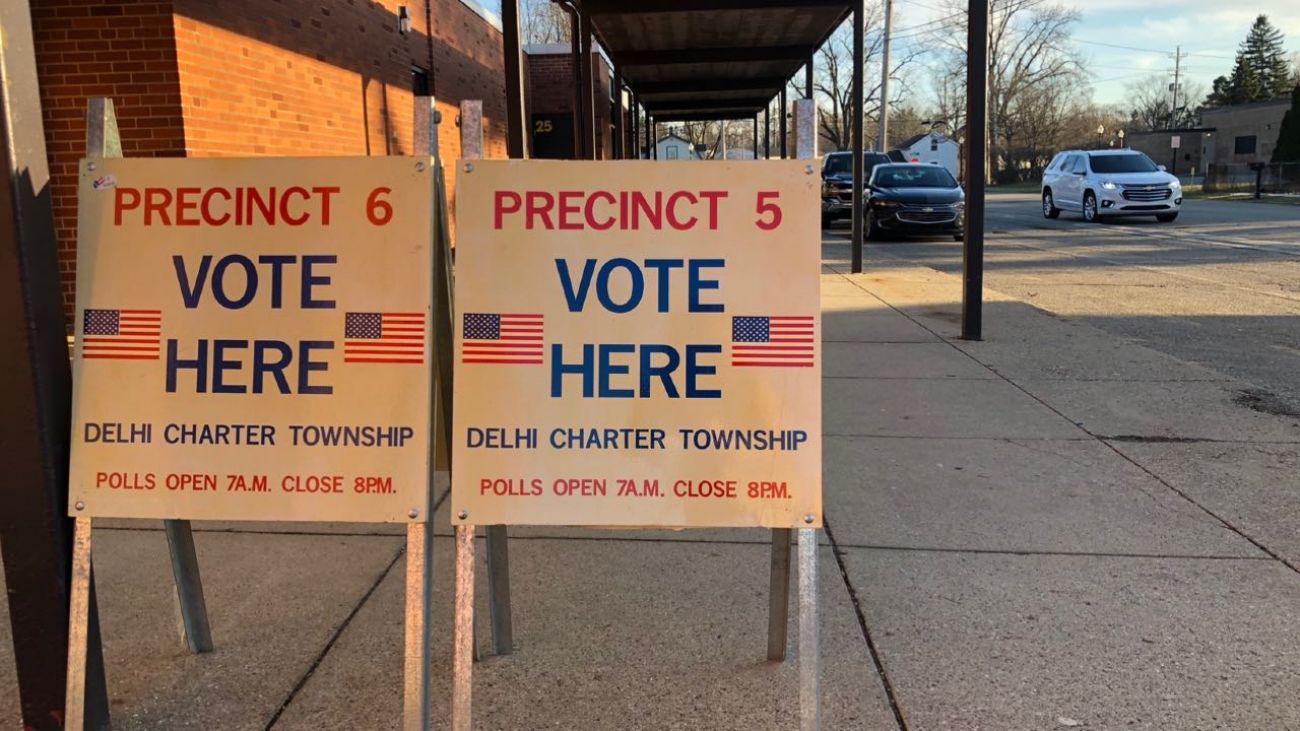Michigan clerks swamped as state rolls out voter reforms

Michigan’s first election with no-reason absentee voting and same-day registration Tuesday resulted in long lines at city clerk offices and an accusation of voter suppression from Democratic presidential candidate Bernie Sanders.
More than 13,000 people registered to vote and cast a ballot on Election Day, Secretary of State Jocelyn Benson told reporters Tuesday night. Just over 6,000 of those registered and voted after 4:30 p.m. Many were young people voting for the first time.
Around 1 million people voted absentee — nearly doubling the total number of people who voted absentee in the 2016 presidential primary and on par with the number cast in that year’s general election.
To Benson, that’s a “great thing.”
Related:
- Michigan clerks’ pleas for help with absentee ballots fall on deaf ears
- Opinion | How Michigan can tackle influx in absentee ballots
“While this expansion of our democracy was historic, it also brings with it challenges for the more than 1,500 election clerks across our state,” Benson said.
Others weren’t so impressed.
Sanders, who lost the Michigan Democratic primary race to Joe Biden, told The Detroit News the long lines amounted to “voter suppression,” while Voters Not Politicians campaigns director Jamie Lyons-Eddy called them “simply unacceptable.”
“It’s time to work together to make sure all Michiganders have fair and equal voting access,” Lyons-Eddy said.
At some city clerk’s offices, the waits to register to vote stretched hours.
It’s nearly 10 pm, AP has called the presidential primary for #Biden and people are still in line to register in #EastLansing @LSJNews pic.twitter.com/dri1FNLKdp
— Sarah Lehr (@SarahGLehr) March 11, 2020
In East Lansing, voters were still waiting in line two hours after polls closed.
Benson said long lines there and in Ann Arbor, Kalamazoo, Grand Rapids and Dearborn were due to a “bottleneck” caused by residents registering and casting in-person absentee ballots on the same day.
She said her office will explore ways to help those locations open satellite offices to help ease congestion in November.
The problems largely seemed confined to a handful of cities, however.
Elsewhere, lines were short. Some estimated that was because so many had already voted absentee.
Lansing City Clerk Chris Swope told Bridge Tuesday evening that the city had registered more than 200 people that day and sent out 11,791 absentee ballots, which is “presidential general election level.”
“It's really exciting to see” the uptick in registration, Swope said. “It's not just young people. I'm actually surprised by the number of people with driver's licenses that show that they've been at this address for six years who are coming in registering for the first time. It’s really heartening.”
One other result of the reforms that final results likely won’t be complete until Wednesday, Benson said.
Biden was cruising to an easy victory and several news outlets declared him the winner, but the exact count may be delayed. That’s because absentee ballot counters must remove each ballot from two envelopes and prepare to put into a tabulator, and they can only begin at 7 a.m. on Election Day.
Benson and local clerks have pushed the Legislature to allow for early processing of ballots to speed up counting on Election Day, but legislation stalled before the primary.
There are likely to be more than 2 million people casting absentee ballots in the general election in November, “significantly more” than in 2016, she said, urging lawmakers to push changes forward.
“We predicted the significant surge in absentee votes,” Benson said. “What we've encountered is a number of others who are not, particularly in the legislature, willing to make those same data-driven analyses and decisions.”
The level of absentee voting that happened across the state was “remarkable,” said Adrian Hemond, partner and CEO of Lansing-based consulting firm Grassroots Midwest.
The Sanders campaign, which performed well with college-aged voters in 2016, “made a concerted effort” to get out the vote among their supporters using the new access to last-minute registration. “But it doesn’t appear to have paid off,” Hemond said.
In the future, that may mean campaigns may begin ads with voters “earlier and earlier” because they’ll be able to cast ballots within 40 days of the election, Hemond said.
In Detroit, few polling places saw long lines, said Ernest Johnson, Detroit Democratic operative, partially because people voted early through absentee ballots. And that could have a big effect on the November election, he said.
“We’re going to have way more voters participate in November,” Johnson said. “That’s bad news for Donald Trump. The 10,000 votes that he won by four years ago — we’re going to double that number in Detroit alone.”
See what new members are saying about why they donated to Bridge Michigan:
- “In order for this information to be accurate and unbiased it must be underwritten by its readers, not by special interests.” - Larry S.
- “Not many other media sources report on the topics Bridge does.” - Susan B.
- “Your journalism is outstanding and rare these days.” - Mark S.
If you want to ensure the future of nonpartisan, nonprofit Michigan journalism, please become a member today. You, too, will be asked why you donated and maybe we'll feature your quote next time!




